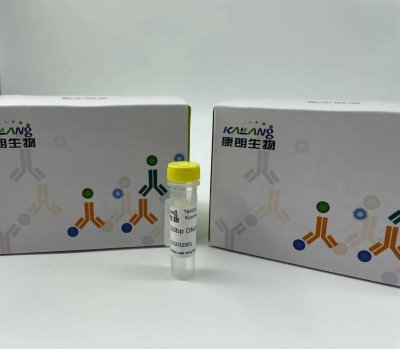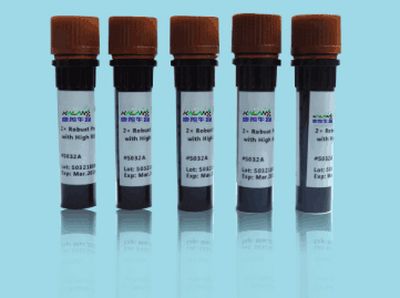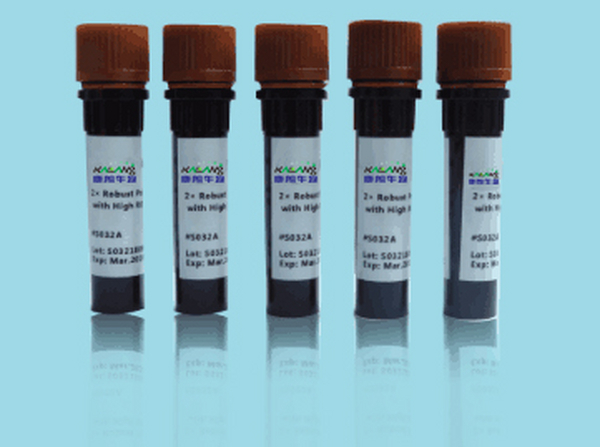QQ:3002763590


客服电话:021-61998208
Flt-4 rabbit Polyclonal Antibody
Flt-4抗体
Flt-4抗体应用:WB 1:500-2000,IHC-p 1:500-200, ELISA 1:10000-20000 fms related tyrosine kinase 4(FLT4) Homo sapiens This gene encodes a tyrosine kinase receptor for vascular endothelial growth factors C and D. The protein is thought to be involved in lymphangiogenesis and maintenance of the lymphatic endothelium. Mutations in this gene cause hereditary lymphedema type IA. [provided by RefSeq, Jul 2008],
FMIP rabbit Polyclonal Antibody
FMIP抗体
FMIP抗体应用:Western Blot: 1/500 - 1/2000. Immunohistochemistry: 1/100 - 1/300. ELISA: 1/20000. function:May be involved in the differentiation of granulocytes and adipocytes.,PTM:Phosphorylated on tyrosine upon binding to activated CSF1R; which causes a dissociation of the two proteins. Phosphorylation on Ser-5 and/or Ser-6 is required for nuclear export. Phosphorylated on Thr-328 in insulin-stimulated adipocytes (By similarity). Phosphorylated upon DNA damage, probably by ATM or ATR.,similarity:Belongs to the THOC5 family.,subcellular location:Shuttles between nucleus and cytoplasm.,subunit:Interacts with phosphorylated CSF1R.,tissue specificity:Ubiquitously expressed.,
FMNL3 rabbit Polyclonal Antibody
FMNL3抗体
FMNL3抗体应用:WB 1:500-2000 The protein encoded by this gene contains a formin homology 2 domain and has high sequence identity to the mouse Wbp3 protein. Two alternative transcripts encoding different isoforms have been described. [provided by RefSeq, Jul 2008],
FMO3 rabbit Polyclonal Antibody
FMO3抗体
FMO3抗体应用:Western Blot: 1/500 - 1/2000. IHC-p: 1/100-1/300. ELISA: 1/20000. flavin containing monooxygenase 3(FMO3) Homo sapiens Flavin-containing monooxygenases (FMO) are an important class of drug-metabolizing enzymes that catalyze the NADPH-dependent oxygenation of various nitrogen-,sulfur-, and phosphorous-containing xenobiotics such as therapeutic drugs, dietary compounds, pesticides, and other foreign compounds. The human FMO gene family is composed of 5 genes and multiple pseudogenes. FMO members have distinct developmental- and tissue-specific expression patterns. The expression of this FMO3 gene, the major FMO expressed in adult liver, can vary up to 20-fold between individuals. This inter-individual variation in FMO3 expression levels is likely to have significant effects on the rate at which xenobiotics are metabolised and, therefore, is of considerable interest to the pharmaceutical industry. This transmembrane protein localizes to the endoplasmic reticulum of many tissues.
FN1 rabbit Polyclonal Antibody
FN1抗体
FN1抗体应用:Western Blot: 1/500 - 1/2000. Immunohistochemistry: 1/100 - 1/300. ELISA: 1/20000. fibronectin 1(FN1) Homo sapiens This gene encodes fibronectin, a glycoprotein present in a soluble dimeric form in plasma, and in a dimeric or multimeric form at the cell surface and in extracellular matrix. The encoded preproprotein is proteolytically processed to generate the mature protein. Fibronectin is involved in cell adhesion and migration processes including embryogenesis, wound healing, blood coagulation, host defense, and metastasis. The gene has three regions subject to alternative splicing, with the potential to produce 20 different transcript variants, at least one of which encodes an isoform that undergoes proteolytic processing. The full-length nature of some variants has not been determined. [provided by RefSeq, Jan 2016],
Fnk rabbit Polyclonal Antibody
Fnk抗体
Fnk抗体应用:Western Blot: 1/500 - 1/2000. ELISA: 1/10000. polo like kinase 3(PLK3) Homo sapiens The protein encoded by this gene is a member of the highly conserved polo-like kinase family of serine/threonine kinases. Members of this family are characterized by an amino-terminal kinase domain and a carboxy-terminal bipartite polo box domain that functions as a substrate-binding motif and a cellular localization signal. Polo-like kinases are important regulators of cell cycle progression. This gene has also been implicated in stress responses and double-strand break repair. In human cell lines, this protein is reported to associate with centrosomes in a microtubule-dependent manner, and during mitosis, the protein becomes localized to the mitotic apparatus. Expression of a kinase-defective mutant results in abnormal cell morphology caused by changes in microtubule dynamics and mitotic arrest followed by apoptosis. [provided by RefSeq, Sep 2015],
最新动态
-

Anti-GNGT1 KL20092-001(50ul)
2021-10-11 -

Anti-GNGT1 antibody(50ul) KL20093-001
2021-10-11 -

α-tubulin mouse Monoclonal Antibody
2021-01-08 -

α-tubulin mouse Monoclonal Antibody(8F11)
2021-01-08
热门标签
- Histone H3 rabbit Polyclonal Antibody Histone H3抗体
- EGFR rabbit Polyclonal Antibody EGFR抗体
- Cy3 Conjugated
- AbFluor™ 555 Conjugated
- AbFluor™ 680 Conjugated
- AbFluor™ 350 Conjugated
- AbFluor™ 647 Conjugated
- AbFluor™ 594 Conjugated
- AbFluor™ 405 Conjugated
- Cy5 Conjugated
- AbFluor™ 488 Conjugated
- Cyclophilin B抗体 Cyclophilin B Monoclonal Antibody(2B10)
- COX IV抗体 COX IV Monoclonal Antibody(6C8)
- PCNA抗体 PCNA Monoclonal Antibody(12D10)
- FAK rabbit Polyclonal Antibody FAK抗体
邮箱:3002763590@qq.com
电话:021-61998208

扫码关注微信公众号






